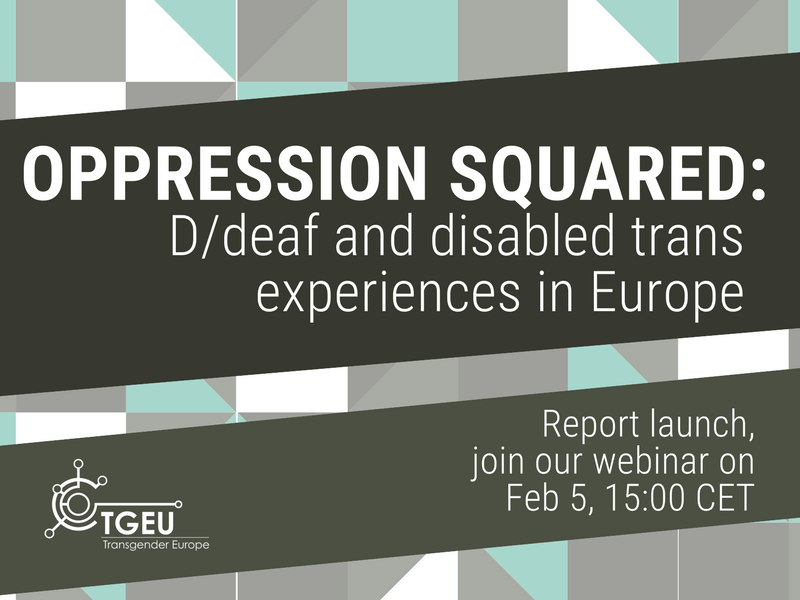Key Policy Principles From ‘Oppression Squared: D/Deaf and Disabled Trans Experiences in Europe’

The report “Oppression Squared“ is the outcome of the 2017 Expert Meeting in Berlin where 10 D/deaf and/or disabled rights experts with experience of trans and LGBIQ activism from Canada, Czech Republic, England, Estonia, Finland, Germany, Hungary, Iceland, Northern Ireland, Scotland and Sweden participated. The meeting and report was facilitated by Nathan Gale.
About the report
This ground-breaking report presents the findings from our expert meeting of D/deaf and disabled trans and queer activists, held in summer 2017.
It sets out the various challenges that D/deaf and disabled trans people face in accessing their human rights, and discusses the barriers that D/deaf and disabled trans people experience in attempting to engage with LGBTIQ organisations. The report includes an extensive list of practical steps that organisations can take to overcome or reduce these barriers.
We have carried out this work because the needs of D/deaf and disabled trans people have been largely missing from LGBTI advocacy. So in order to represent D/deaf and disabled trans people we had to find out what their advocacy priorities are. We also saw this as an an opportunity to learn about the improvements that need to be made for the organisation to better engage with D/deaf and disabled trans people.
The expert group identified the following human rights as key priorities for D/deaf and disabled trans people:
- Right to healthcare
- Freedom from torture or cruel, inhumane or degrading treatment
- The right to live independently
- Respect for privacy
Right to healthcare
Experiences of disabled trans people in healthcare are characterised by ableist attitudes, gatekeepers, poor accessibility and lack of autonomy. This includes assumptions about whether people can make decisions about their care and treatment, failures to take seriously the extent of the pain that people are in, and refusal to provide fertility treatment, contraception. Transphobic and ableist attitudes of healthcare providers, lack of public funding, and inaccessible information cumulate and lead to requirement to “control” mental health prior to treatment, limiting agency of D/deaf and disabled people regarding decisions about their gender identity, and treatment restrictions in relation to weight or ‘Body Mass Index’.
Strategies to improve D/deaf and disabled trans people’s experience of healthcare
- Working with providers to produce trans-specific healthcare information in alternative formats
- Providing trans awareness training to healthcare practitioners
- Partnering with organisations that advocate for access to healthcare
- Lobbying local governments to fund accessible transport to attend appointments.
Freedom from torture or cruel, inhumane or degrading treatment
Ableism combined with transphobia put D/deaf and disabled trans people at a particular risk of experiencing torture or ill treatment in a psychiatric healthcare or social care setting. This can take the form of physical and sexual violence, forced treatment, extreme and unnecessary restraint. People of colour more likely to be detained and ill-treated in institutional settings.
The following strategies can help secure disabled trans people against torture and ill-treatment:
- Engaging with D/deaf and disabled trans people who have experienced these rights violations to amplify their voices;
- Highlighting the increased risks of torture when discussing forced sterilisation with policy makers;
- Supporting organisations providing advocacy to mad people and/or people with psychosocial disabilities, and people with learning or cognitive impairments, to advocate for trans people;
- Lobbying for trans awareness training to be provided to healthcare practitioners working in psychiatric and residential care facilities.
The right to live independently
The right to live independently is often obstructed by difficulties in engaging with government agency when documents don’t reflect gender identity and/or chosen name.
Having to go through some kind of assessment before a support is granted can involve the assessor asking intrusive questions about personal aspects of a person’s body and how it functions; making gendered assumptions about the tasks a person needs or wants to undertake; while not taking into account that some individuals need help to put on binders, prosthetics, or hairpieces.
The right to live independently for disabled trans people can be supported by:
- Lobbying governments to ensure that the specific concerns of D/deaf and disabled trans people are taken into account in independent living strategies.
- Forming partnerships with disabled people’s organisations, particularly those specialising in independent living.
- Delivering training to organisations that provide assistance with everyday living.
- Joining anti-austerity campaigns to resist reductions to government funding for independent living
Respect for privacy
Disabled trans people experiences violations of their right to privacy mainly in three areas: legal gender recognition, (public) bathrooms, and air travel.
Information about how to apply for gender recognition is often inaccessible due to the format it is provided in, i.e. complicated language. Individuals may struggle to meet requirements such as having been diagnosed with “gender identity disorder” or providing proof of having lived as a particular gender for the required period (“real life test”). If those providing support are transphobic, they may well prevent the D/deaf or disabled trans person from applying for LGR.
When travelling by air the right to privacy is likely to be undermined. Airlines may ask intrusive, and offensive questions about impairments. When going through airport security, if using a wheelchair or other mobility aid prevents people from going through the scanner, they will be physically searched by a member of security staff. On the airplane, wheelchair users will have their wheelchairs stored in the hold and so may be unable to move around the cabin and have to take care of their toilet needs at their seat.
The following strategies can aid disabled trans people in having their right to privacy secured:
- Collaborate with disabled people’s organisations to provide information on legal gender recognition in alternative formats, such as Easy Read, large print, sign language etc.
- When campaigning for legal gender recognition, include the specific difficulties facing D/deaf and disabled people.
- Deliver trans awareness training to staff working for companies who provide access assistance services at airports